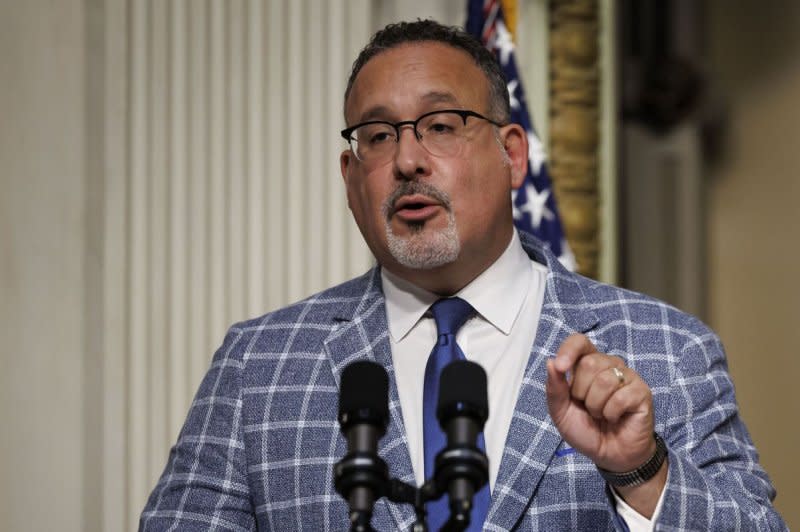Biden administration Title IX rules protecting LGBTQ students face state challenges

May 9 (UPI) -- The Department of Education's recent release of its final Title IX regulations has sparked backlash from conservative state officials.
Officials from nearly two dozen GOP-led states have voiced their opposition to regulations that protect all students from sex and gender-based harassment and discrimination. Multiple states have filed lawsuits, while state leaders like Nebraska Gov. Jim Pillen and Florida Gov. Ron DeSantis, both Republicans, said their states will not comply.
The basis for this opposition is that the final Title IX regulations clarify sex-based discrimination and harassment includes discrimination based on gender identity.
Texas Attorney General Ken Paxton was among the first to take legal action against the Biden administration over the final Title IX regulations. Paxton alleges that the regulations "expand the definition of 'sex' to include one's self-professed 'gender identity.'"
DeSantis' statement on the Title IX regulations claims that President Joe Biden is attempting to "rewrite Title IX" and "inject men into women's activities." However the provisions released by the Department of Education do not include any mandates related to sports.

States like Florida, Oklahoma and Nebraska -- where officials have said they will not comply with Title IX -- risk losing federal funding from the Department of Education.
"The Department crafted the final Title IX regulations following a rigorous process to give complete effect to the Title IX statutory guarantee that no person experiences sex discrimination in federally funded education," the Education Department said in a statement to UPI. "As a condition of receiving federal funds, all federally funded schools are obligated to comply with these final regulations, and we look forward to working with school communities all across the country to ensure the Title IX guarantee of nondiscrimination in school is every student's experience."
Joshua Block, senior staff attorney with the ACLU's LGBTQ Project, told UPI that it is rare for the Department of Education to withhold funding to a state for noncompliance. He does not recall it ever happening for noncompliance with Title IX. The more likely enforcement route would be through a lawsuit.
"Private lawsuits are often the way Title IX is enforced," Block said. "Withholding funding is sometimes too blunt an instrument. Sometimes you have people saying they're being threatened with a loss of funding but that's really a very remote possibility."
Louisiana Attorney General Liz Murrill expressed such a concern when she announced she would sue over the final Title IX regulations. She alleged that the regulations ignore "significant safety concerns for young women and students."
"Title IX funding is threatened whether you comply or not, creating an impossible situation for everyone involved," Murrill said in a statement.
Block highlighted the lawsuit against North Carolina over a 2016 bill that required transgender people to use the bathroom that aligns with their birth gender rather than the gender with which they identify.
"Even in North Carolina when they passed a bathroom ban the Department of Education didn't withhold funding," Block said. "They filed a lawsuit in court."
The policy was ultimately revoked.
Block explains that there has been disagreement in the circuit courts over the rights and protections Title IX guarantees to transgender students. The Fourth and Seventh Circuit Courts have ruled that Title IX prohibits schools from excluding and discriminating against trans students. This notably applies to policies that bar trans students from using the restroom that affirms their gender identity.
The Eleventh Circuit Court has ruled that gender identity and sexual orientation are not protected.
The Supreme Court has established a precedent that discrimination based on sexual orientation and gender identity is unlawful, notably in the landmark Title VII case Bostock vs. Clayton County, Ga. In this case, Gerald Bostock was fired from a county job after participating in a gay softball league.
The Eleventh Circuit ruled that Title VII -- which protects employees from discrimination based on race, color, sex, religion and national origin -- does not cover discrimination based on sexual orientation. The Supreme Court disagreed, ruling 6-3 to overrule the Eleventh Circuit in 2020.
"Today, we must decide whether an employer can fire someone simply for being homosexual or transgender. The answer is clear," Associate Justice Neil Gorsuch wrote in the majority opinion. "An employer who fires an individual for being homosexual or transgender fires that person for traits or actions it would not have questioned in members of a different sex. Sex plays a necessary and undisguisable role in the decision, exactly what Title VII forbids."
Block said the Department of Education is now clarifying that the Fourth and Seventh Circuit Courts are right and the Eleventh Circuit is wrong.
"As those courts already held, Title IX and its regulations don't allow schools to exclude trans students from restrooms consistent with their gender identity," Block said. "While opponents of the regulation want to portray this as changing what Title IX requires, from our perspective the regulations reflect what Title IX already requires."
The regulations do not expand or change the definition of sex. They clarify that sex-based harassment includes discrimination based on sex stereotypes, characteristics, orientation, gender identity and pregnancy or related conditions.
They also provide clearer guidelines for how school officials should report incidents of sex-based discrimination, harassment and assault.
Betsy DeVos, secretary of education under the administration of former President Donald Trump, announced changes to Title IX in 2020. Those changes were met with concern from women's rights advocates who worried that they could deter victims of sexual assault, discrimination and harassment from filing complaints.
The Trump-era regulations expanded protections for those accused of violations.
According to the 2021 National School Climate Survey by the Gay, Lesbian and Straight Education Network, about 53.7% of LGBTQ students were sexually harassed in the year prior at school. About 61.5% of LGBTQ students who had been harassed or assaulted at school did not report the incident because they did not believe the school staff would do anything about it.
About 60% of students who did report to school staff said nothing was done.
Andrea Terry, committee chair for the California Faculty Association's political action and legislation committee and Sacramento State professor, told UPI she has seen reporting fail.
Terry testified to the state Assembly Higher Education Committee last month in a hearing about Title IX reform. Central to her testimony was the story of one of her students who had been assaulted in her dorm room while Terry was teaching at California Polytechnic State University.
"She reported it to the Title IX office and the university moved her to a different dorm building," Terry said. "She didn't know what was happening with the case. She still saw her assailant around campus. I helped her reach back to the Title IX office. We found out in the process of them having a change in staff that all of her information had been lost."
Terry said after she moved to her current position at Sacramento State the student still did not have a resolution. She had to start the process of reporting over, an experience that can be retraumatizing to victims.
Terry and the CFA have proposed a package of bills to the California legislature to reform Title IX and improve the process of reporting sexual assaults and harassment. While researching these issues across California State University campuses it was discovered that about two-thirds of cases exceeded the required timeline for action.
"The standards that we do have are not being followed," Terry said. "There is great inconsistency in how the process happens and how complainants are kept up with."
Terry emphasized that having regulations in place is only one part of the equation. Resources and a commitment from institutions to follow through with investigations and enforcement have often been lacking.
While Terry's focus is on Title IX in California, she said it is important to continue putting pressure on institutions across the country to comply with it.
Brian Dittmeier, GLSEN director of public policy, told UPI that the states that have opposed the regulations, particularly as they pertain to LGBTQ students, have some of the highest rates of incidents. For example, about 75% of LGBTQ students in Florida experienced some form of discrimination, harassment or assault in the past year.
"An important point to keep in mind, taking a broader view than just compliance with federal law, this is also the right thing to do to ensure a safe environment for students," Dittmeier said. "What we see is states with inclusive policies tend to have safer environments for their students. There are reduced incidents of bullying and harassment in the first place."
Dittmeier recalled the recent death of Nex Benedict, a 16-year-old nonbinary student in Oklahoma. Benedict was severely beaten by three female students in a school restroom, resulting in their hospitalization.
Dittmeier said the assault of Benedict is not a rare occurrence for LGBTQ students. State policies can establish a more inclusive environment in schools or set a tone of intolerance that creates a greater risk for those students.
"Many schools want to do the right thing but are also hamstrung by state law or policy," he said. "We see examples of regulations that spell out that schools should not be denying trans or nonbinary students access to bathrooms that are consistent with their gender identity."
"We unfortunately have 10 states that have passed state laws that require trans students to be in facilities inconsistent with their gender identity," Dittmeier continued. "It puts schools in a precarious position, trapped between state and federal civil rights regulations."


